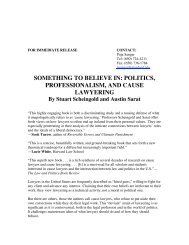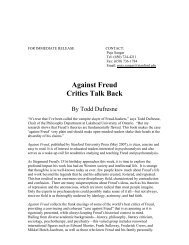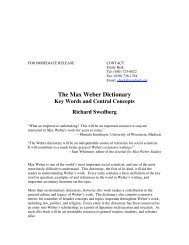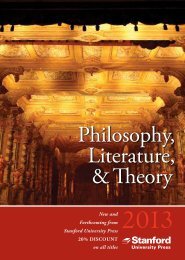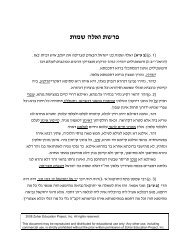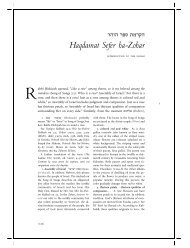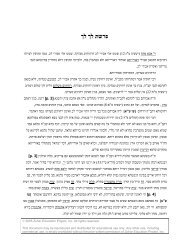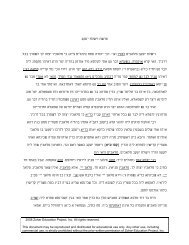Front Matter (PDF) - Stanford University Press
Front Matter (PDF) - Stanford University Press
Front Matter (PDF) - Stanford University Press
Create successful ePaper yourself
Turn your PDF publications into a flip-book with our unique Google optimized e-Paper software.
The Franco-Rhenish tradition also had room for a strongmagical component<br />
tion.<br />
to religion. Ancient speculations on secret names of God and the<br />
still held currency in these circles. The power of using such names to<br />
angels<br />
the divine will, utter blasphemy in the eyes of the Maimonidean, was<br />
affect<br />
for granted in early Ashkenaz, as it had been centuries earlier throughout<br />
taken<br />
Jewish world.<br />
the<br />
secrets of Kabbalah were made public in this age as a way to combat<br />
The<br />
in¯uence of Maimonidean rationalism. The freedom and implied disinter-<br />
the<br />
in human affairs of the philosophers' God frightened the mystics into<br />
est<br />
of the deep esotericism that had until then restricted them to oral<br />
comingout<br />
of their teachings within closed conventicles of initiates. Their<br />
transmission<br />
were to serve as an alternative explanation of the Torah, one that saw<br />
secrets<br />
and its commandments not only as playinga vital role in the ongoing<br />
Torah<br />
life of Israel, but also as havinga cosmos-sustainingrole in a view of<br />
spiritual<br />
universe that made them absolutely essential. It is no accident that two of<br />
the<br />
key subjects discussed in these earliest kabbalistic speculations are the<br />
the<br />
or secret meanings of prayer and ta'amei ha-mitsvot, the reasons for<br />
kavvanot<br />
commandments. Both of these are interpreted in a way that insists on the<br />
the<br />
effects of human actions. The special concentration on divine names<br />
cosmic<br />
an essential part in early Kabbalah, settingin course a theme that was to<br />
played<br />
developed over many centuries of kabbalistic praxis.<br />
be<br />
secret doctrines ®rst taught in Provence were carried across the Pyr-<br />
The<br />
in the early thirteenth century, inspiringsmall circles of mystics in the<br />
enees<br />
district of Catalonia. One key center of this activity was the city of<br />
adjacent<br />
well known as the home of two of the most important rabbinic ®gures<br />
Gerona,<br />
the age, Rabbi Moses ben Naḥman (called Naḥmanides) and Rabbi Jonah<br />
of<br />
(c.1200±1263). Naḥmanides, perhaps the most widely respected Jewish<br />
Gerondi<br />
®gure of the thirteenth century, is the most important personage<br />
intellectual<br />
with the early dissemination of kabbalistic secrets. He was a leading<br />
associated<br />
commentator, scriptural interpreter, and legal authority. His Torah<br />
Talmudic<br />
includes numerous passagesÐmost brief and intentionally obscure,<br />
commentary<br />
but several lengthy and highly developedÐwhere he speaks ``in the way<br />
truth,'' referringto secret kabbalistic traditions. Alongside Naḥmanides<br />
of<br />
emerged a somewhat separate circle of kabbalists including two very<br />
there<br />
teachers, Rabbi Ezra ben Solomon and Rabbi Azriel. These ®gures<br />
important<br />
to have been more innovative than Naḥmanides in their kabbalistic exe-<br />
seem<br />
and also more open to the Neoplatonic philosophy of Abraham Ibn Ezra<br />
gesis<br />
others that was gaining credence in their day. Naḥmanides was essentially<br />
and<br />
in his kabbalistic readings, insisting that he was only passing<br />
conservative<br />
what he had received from his teachers, and his view of philosophical<br />
down<br />
in general was quite negative. Rabbi Ezra, the author of commentaries<br />
thought<br />
the Songof Songs and some Talmudic aggadot, and his disciple Rabbi<br />
on<br />
Introduction<br />
xxxvii<br />
Azriel, who wrote a larger treatise on the aggadot as well as a widely quoted



